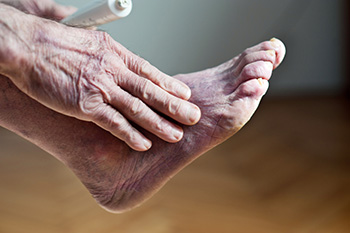
Poor foot circulation, often linked with conditions like peripheral artery disease or diabetes, presents diverse symptoms such as numbness, tingling, weakness, coldness, or cramping in the feet and legs. This condition is more common as one ages. Restricted blood flow deprives tissues of oxygen and nutrients, causing discomfort and potentially severe issues like non-healing wounds or ulcers. The causes typically involve arterial narrowing or blockage due to factors such as smoking, high blood pressure, cholesterol, or diabetes. Lifestyle changes like quitting smoking, managing health conditions, staying active, and a healthy diet can aid in circulation improvement. If you have poor foot circulation and it is persistent or worsening, it is suggested that you seek prompt evaluation by a podiatrist. This type of doctor employs various diagnostic tests to assess circulation and devises personalized treatment strategies that can address underlying conditions and relieve symptoms.
While poor circulation itself isn’t a condition; it is a symptom of another underlying health condition you may have. If you have any concerns with poor circulation in your feet contact Jim Maxka, DPM of South Penn Foot & Ankle Associates. Our doctor will treat your foot and ankle needs.
Poor Circulation in the Feet
Peripheral artery disease (PAD) can potentially lead to poor circulation in the lower extremities. PAD is a condition that causes the blood vessels and arteries to narrow. In a linked condition called atherosclerosis, the arteries stiffen up due to a buildup of plaque in the arteries and blood vessels. These two conditions can cause a decrease in the amount of blood that flows to your extremities, therefore resulting in pain.
Symptoms
Some of the most common symptoms of poor circulation are:
- Numbness
- Tingling
- Throbbing or stinging pain in limbs
- Pain
- Muscle Cramps
Treatment for poor circulation often depends on the underlying condition that causes it. Methods for treatment may include insulin for diabetes, special exercise programs, surgery for varicose veins, or compression socks for swollen legs.
As always, see a podiatrist as he or she will assist in finding a regimen that suits you. A podiatrist can also prescribe you any needed medication.
If you have any questions, please feel free to contact our office located in Hanover, PA . We offer the newest diagnostic and treatment technologies for all your foot care needs.
